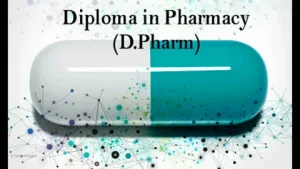For individuals passionate about healthcare and interested in pursuing a career in pharmacy, diploma programs offer a viable pathway to enter the pharmaceutical field. Pharmacy diplomas provide specialized training and practical skills necessary for entry-level positions in pharmacies, healthcare facilities, and pharmaceutical industries. In this comprehensive overview, we explore various pharmacy diploma options, their curriculum, career prospects, and suitability for aspiring pharmacy professionals.
1. Diploma in Pharmacy (D.Pharm): Bridging Theory with Practice

The Diploma in Pharmacy (D.Pharm) is a foundational program that focuses on imparting essential knowledge in pharmaceutical sciences, pharmacology, pharmacy practice, and drug dispensing. Spanning two years, D.Pharm programs emphasize a blend of theoretical learning and practical training, equipping students with the skills required for pharmacy practice.
Curriculum: The curriculum of D.Pharm programs typically covers subjects such as pharmaceutical chemistry, pharmacognosy, pharmacology, pharmaceutics, hospital pharmacy, and pharmaceutical jurisprudence. Students undergo practical training in pharmacy dispensaries, hospitals, and community pharmacies to gain hands-on experience in drug dispensing, compounding, and patient counseling.
Career Prospects: Graduates of D.Pharm programs can pursue entry-level positions as pharmacy technicians, dispensing assistants, pharmacy aides, or sales representatives in pharmacies, hospitals, and pharmaceutical companies. They play crucial roles in assisting pharmacists in drug dispensing, inventory management, and patient education.
2. Diploma in Medical Laboratory Technology (DMLT): Exploring Diagnostic Sciences

While not strictly a pharmacy diploma, the Diploma in Medical Laboratory Technology (DMLT) offers an alternative pathway for individuals interested in healthcare and laboratory sciences. DMLT programs focus on laboratory techniques, diagnostic procedures, and quality assurance in medical laboratories.
Curriculum: DMLT curricula cover subjects such as clinical pathology, hematology, microbiology, clinical biochemistry, immunology, and laboratory management. Students receive hands-on training in laboratory techniques, specimen collection, handling, and analysis, along with exposure to laboratory equipment and instrumentation.
Career Prospects: DMLT graduates can work as medical laboratory technicians, laboratory assistants, phlebotomists, or research assistants in clinical laboratories, diagnostic centers, hospitals, and blood banks. They play vital roles in conducting diagnostic tests, analyzing specimens, and assisting healthcare professionals in disease diagnosis and patient care.
3. Diploma in Pharmaceutical Marketing and Management: Navigating Business and Sales

For individuals interested in the business aspect of the pharmaceutical industry, a Diploma in Pharmaceutical Marketing and Management offers specialized training in marketing strategies, sales techniques, and pharmaceutical business management.
Curriculum: The curriculum of Diploma in Pharmaceutical Marketing and Management programs includes subjects such as pharmaceutical marketing principles, sales management, regulatory affairs, healthcare ethics, and pharmaceutical economics. Students learn about pharmaceutical product promotion, market analysis, distribution channels, and pharmaceutical regulations.
Career Prospects: Graduates of Diploma in Pharmaceutical Marketing and Management programs can pursue careers as pharmaceutical sales representatives, marketing executives, product managers, or business development associates in pharmaceutical companies, healthcare organizations, and marketing agencies. They play crucial roles in promoting pharmaceutical products, building client relationships, and driving sales growth.
Making an Informed Choice
When considering the best pharmacy diploma for your career aspirations, it’s essential to evaluate your interests, strengths, and long-term goals. Research each diploma program thoroughly, consider the curriculum, practical training opportunities, and career prospects, and seek guidance from academic advisors or career counselors.
Ultimately, the best pharmacy diploma is one that aligns with your passion, skills, and career objectives. Whether you choose a D.Pharm, DMLT, or Diploma in Pharmaceutical Marketing and Management, each pathway offers unique opportunities for professional growth and contribution to the pharmaceutical and healthcare industry. By making an informed choice, you can embark on a rewarding journey in pharmacy, dedicated to improving patient care and advancing healthcare services.


